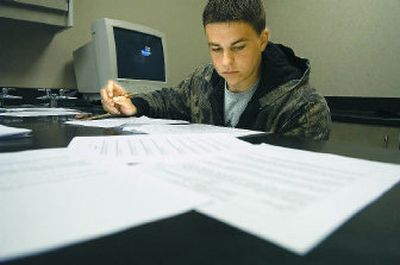Passing expectations

With her senior year looming, Central Valley High School junior Angelina Tinoco will not spend the last week of school celebrating her rise to the top.
Instead, the 16-year-old will spend next week finishing a portfolio of work that she hopes will be her ticket to graduation next year.
Tinoco is part of the famed class of 2008 – the first required to pass all parts of the WASL to graduate.
Tinoco, whose native language is Spanish, spoke little English when she took the WASL last year and failed all three parts of the high-stakes exam. This year, the teen has been putting together a collection of work samples as a way to show proficiency on the state test.
“I’ve done more reading and writing this year than in my entire life,” Tinoco said
Her school district is one of very few in the area helping students put together what is called “a collection of evidence” by school officials.
It’s one of several alternatives to the Washington Assessment of Student Learning approved by the state.
Although the state Legislature provided a reprieve to students who have not yet met standards in math by delaying that requirement for three years, students who have yet to pass the reading or writing portions are still at risk of not graduating.
Last year, 14 percent of sophomores failed the reading portion of the test, and 16 percent did not pass the writing section. Nearly 46 percent didn’t meet the standard in math.
Letters will be sent today to high school students who took the test this spring to inform them whether they passed; this includes students who may be taking the test for the second or third time.
But changes to legislation provide dozens more options for students such as Tinoco. Students who fail the standardized test once can immediately begin seeking an alternative to the test. Before, a student had to fail at least twice. Some of the alternatives are new.
Students are also required to keep taking the WASL test each year, and those who failed math must take additional math courses.
Some alternatives include scoring high on the SAT or the PSAT college-entrance exams, comparing an earned grade in a class to that of a student who did pass the WASL, or putting together a collection of evidence.
While schools in other area school districts have used state money to provide extra help for students struggling with the WASL, Central Valley is the only district in the Spokane area that is offering classes focused on creating a collection of evidence to prove a student meets state standards.
“So many districts took a ‘let’s wait and see’ attitude,” said Evan Sorenson, a CV administrator. “We jumped in at the beginning and said ‘let’s provide another opportunity for our students.’ “
About 53 students are enrolled in the courses at the district’s two high schools.
Using templates created by the state, teachers work with students in math or reading and writing to put together a portfolio of work that demonstrates a student has the skills required to pass those subject areas of the WASL.
Students provide eight to 10 work samples. Some of the work is done independently, while some with assistance from the teacher. All of the work must meet certain targets defined by state academic learning requirements.
“It’s not easier than the WASL; it’s more difficult, and it’s more work,” said Elaine Fotland, an English teacher at CV. Fotland has two WASL workshop classes: one for sophomores and one for juniors.
Other districts, like Spokane Public Schools, are encouraging students to take WASL remediation courses over the summer and during the year and to keep retaking the exam.
“We still believe … that it will be easier for them to meet standard by retaking the WASL,” said Emmett Arndt, a Spokane Public Schools administrator. “But we do know there are some students that have test phobia that cannot perform in that kind of setting.”
Some districts don’t have classes but have a few students putting together collections for submission to the state next week, although they anticipate an increase after students learn their scores for this year.
“It takes a pretty big committed effort from the kid and all the teachers to put that collection of evidence together,” said Gene Sementi, assistant superintendent for the West Valley School District.
“But I would expect that next year that number will pick up. … Kids who didn’t pass the WASL … will probably see that as a pretty viable option for next year.”
Several Central Valley students don’t want to wait that long. Some students hope to be ready to submit their samples to the state by the end of next week.
“I still have about four samples left to finish,” said Karen Akins, 17.
“This has definitely been harder than the test itself.”
Akins failed all three portions of the test and, in addition to being enrolled in a reading and writing workshop, is also putting together a portfolio for math. Akins retook the writing exam last summer and missed passing by one point.
She’s waiting for results from taking all parts of the exam again this spring.
“If I don’t pass, I’ll be doing this again as a senior,” Akins said. “If I do pass, all this will be a big waste of time.”